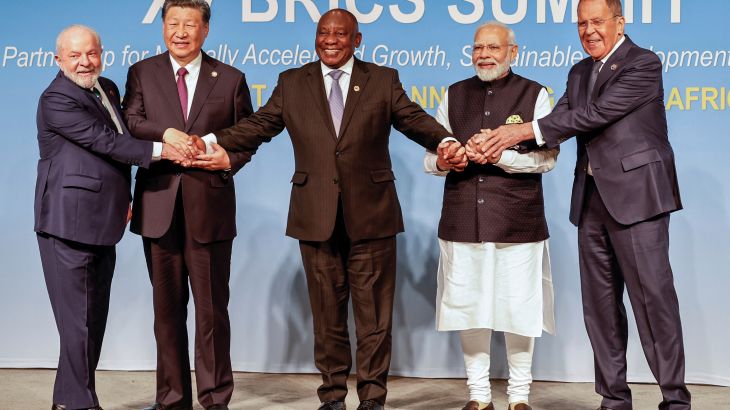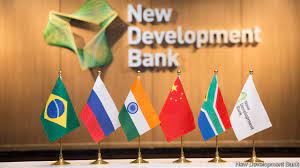
BRICS expansion draws new market pattern, away from energy transition

Sopuruchi Onwuka
The selection of new members into the bloc of developing countries hosted in BRICS will not only cause name change in the group whose name is an acronym of the five founding members: Brazil, Russia, India, China and South Africa.

But with the invitation of fast growing economies from the Middle East and North Africa (MENA), all major oil producing countries, the name of the group will not only change. The group itself appears to be developing diplomatic and energy market pattern that may preserve fossil fuel value.
The Oracle Today reports that despite several declarations of intention to join the BRICS bloc ahead of its August meeting in South Africa, the group Saudi Arabia, Iran, Egypt, Argentina, Ethiopia and the United Arab Emirates to join their bloc from January 1.
Whereas the parameters for selection are clear and based on economic performance of the countries invited, it is also clear that these economies would all rely on fossil fuel to drive sustained growth in the foreseeable future.
The combination of the countries in the emerging bloc would also consolidate the diplomatic alignment engineered by China to dismantle Western influence in the Middle East and foster regional cooperation that would inevitably confer respect, influence and energy supply on China.
In return, China, which holds world’s largest foreign reserves in dollars and the status of world’s fastest economic expansion rate, is on the way to becoming the largest single market share and funding source for the petroleum industry in the face of hostility from international multilateral lenders.
It is obvious that bringing Saudi Arabia, Russia, Iran, the UAE and Brazil under one economic bloc captures the main global energy supply map while China and other fast growing economies in Africa and Asia form the future market for petroleum production.
Countries like Nigeria, Angola, Libya and smaller African petroleum producers are actually neither reliable producers nor industrial powerhouses with firm control on demand. Besides, production is beginning to peak in most of the traditional African petroleum systems.
It does appear therefore that key consideration in selecting new members of the group was carefully thought out to balance out future market that sustains petroleum in the global energy mix as new landscape that hypes energy transition threatens the oil and gas industry with funding stricture.
South African President, Cyril Ramaphosa, explained in a combined briefing at the end of the BRICS summit that “agreement had also been reached on the need to overhaul the global financial architecture and key institutions to make the world more equitable, inclusive and representative.”
The Oracle Today reports that the industrialized western economies including the United States, European Union, Canada, United Kingdom and Australia which are hosted in the rival Organization of Economic Cooperation and Development (OECD) drive the energy transition initiative which seeks to earn them independence from the oil market and confer them with production base for green energy.
Whereas the OECD nations who share diplomatic, economic and military bond enact policies that set deadlines for energy transition from fossil, the multilateral lenders they support, including the World Bank and International Monetary Fund (IMF); their stock markets; and all financial institutions are under mandate to starve new fossil development of funding.
But with the New Development Bank formed by the emerging market group, a pool of funding might be available to the petroleum industry outside the traditional lending routes controlled by the OECD countries. This is where the membership of rich oil states with robust pile of sovereign wealth funds becomes very critical to the group.

Weeding out debt wrecked nations like Nigeria from the group makes a lot of sense to avoid scramble for funds designed to propel countries like Egypt, Ethiopia and South Africa which are already in the fast lane to economic advancement.
China and India, the two fastest emerging markets, are clearly not sensitive to which energy that drives their industrial plants. And with its huge pile of dollar reserves, China has been bullish on supply sustainability as its economy smarts from pandemic downturns.
Frosty diplomatic relations between the United States and key oil producers in the Middle East contrasts with China’s peace and reconciliation initiatives in the region, a move that has brought Iran and Saudi Arabia from threats of war to reconciliation table.
In Africa, China has been generous with its soft loans with which it creates market for its construction companies in a continents dominated by European civil works contractors including Julius Berger, Capa D’Alberto, Costain and others. Although the Chinese loans primarily pay back Chinese companies, they deliver the key economic objective of leaving behind a lasting infrastructure in the benefiting countries.
The BRICS nations are also the main diplomatic support base for the battered Russia after its crumbled diplomatic relationship with the West. Despite the trade sanctions of the country, it manages to sell its crude oil to dedicated China at discounted rates.
South Africa has been in the forefront of the African missions to Moscow in trying to broker end of the war with Ukraine and also opening safe routes for food export from both countries to the hungry continent. In return, Russia has pledged free supply of grains to select African countries to address their concerns about supply from Ukraine.
The inclusion of Middle Eastern countries in the emerging markets group completes the triad of economic and energy diplomacy for both Russia and China and guarantees sustainable market for key oil producers and the petroleum industry as energy transition slowly gathers steam.
What is clear from the over 20 requests to join the BRICS led group is the burning desire of countries to find alternative global space outside the prevailing room already choked up by fat elephants from Europe and America.
President Xi Jinping of China stated that the expansion of BRICS is historic as a new starting point for cooperation among developing nations.



